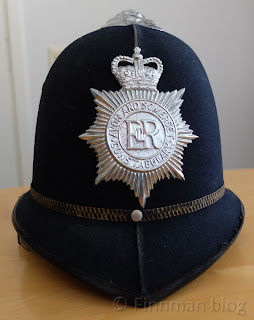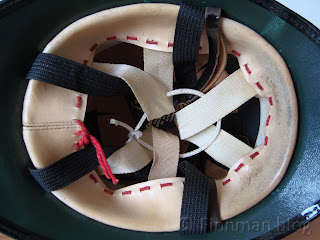Avon & Somerset Constabulary helmet 1980-83
 |
| Avon & Somerset Constabulary helmet c.1980 |
This almost mint example is one of the first helmets constructed from an ABS plastic shell. This version was issued from about 1980 to 1984 to replace the traditional cork helmets. Externally it looks the same as the cork version but with a new style of liner. This version of helmet is hard to find in good original condition. Expect to pay around £35-£42 in a private sale for this version.
On the outside, the rose motif on the rear of the black metal band was replaced with a plain stud. The helmet plate is made from plastic with a single plastic screw fixing.
 |
| Example 1 |
The helmet seen here retains the same patent leather chin strap found on the old cork helmet. The plastic shell is dark green to resemble the same colour used on the old cork helmets. The white nylon string seen in the photo securing the cotton web harness was often removed for a better fit (as seen in the second example below).
 |
| Example 2 |
This second example has the nylon web harness chin strap still intact. Note the cork insert has been damaged. The cork becomes brittle with age and can easily break. Such damage can also be an indication that the helmet plate has been tampered with at some point.
Unusually, this helmet had three neat holes drilled to the front and is fitted with the older style metal helmet plate with lugs. This type of helmet would normally have just one central hole for the plastic helmet plate. I've been informed that such a modification has been known, by serving officers who preferred the older style metal helmet plate. Although more likely to have used a more primitive method of creating holes such as puncturing with a screwdriver. I'm sure such modifications were not permitted and therefore quite rare.
I've seen two examples of Avon & Somerset helmets with metal helmet plates fitted to an ABS shell. Perhaps some were issued like this due to a shortage of the first plastic badges? There's also the possibility it had holes drilled post-service by a dealer or collector as the metal helmet plates are easier to find than the plastic ones if the original badge was missing or damaged.
The first versions of this ABS helmet had a rubber pad glued inside the helmet behind the helmet plate and also one covering the helmet top rose prongs as seen below. If the pieces of rubber are still intact then it's most likely the original helmet plate. However, these rubber pads were no longer fitted on later helmets. As with most new products, they are gradually 'watered down' over time in an effort to save costs.
 |
| Circular rubber pad glued behind the helmet rose |
 |
| Rubber pad glued behind the helmet plate |
The third example below has all the original straps intact. Although it appears slightly tatty, it's a good example of a well used helmet in original condition. The cork liner has just one area of damage behind the helmet plate. It's possible this was damaged when the helmet plate was first fitted (see second photo) or when replacing a broken helmet plate as the plastic versions could easily be damaged. Fitting the helmet plate once the cork liner is already in place is fiddly and can result in damage to the liner.
Helmets are supplied either with or without the helmet plates pre-fitted. Some Police Forces have preferred to fit their own helmet plates as this is a slightly cheaper option. Avon & Somerset currently order their helmets with the helmet plates pre-fitted. No doubt it's viewed as too time consuming to do it themselves.
On this example, some of the stitching on the plastic beading around the edge has come undone (fifth photo). This can often be seen on well used older helmets. The Compton Webb makers label (black and gold) is glued to the cork liner and can just be seen in the centre behind the straps in the sixth photograph. The black harness chin strap is made of cotton webbing.
 |
| Avon & Somerset Constabulary helmet example 3 |
 |
| This helmet uses a brass helmet band and rose which are painted black |
 |
| The black paint has worn off the brass band and steel stud |
 |
| The stitching has become detached from the plastic beading |
 |
| Example 3 helmet liner |
 |
| Example 3: The owners number is written on the liner strap |
 |
| A paper helmet size label (57cm) is glued to the makers label |
 |
| The headband is made from white foam covered in a red 'satin' material |
The helmet above has certainly seen lots of use over the years. The 'wear and tear' seen here is typical of a well used helmet. Some of the black paint has worn off the brass helmet band as well as the steel front stud holding it on. Notice also the slight colour loss from wear on the front peak. This is caused from frequent handling when putting the helmet on and taking it off again. The wear appears on the right-hand side which would be expected for a right-handed person.
After perhaps just a few years, the red satin liner was replaced with a nylon/foam headband and liner insert. The first of these retained the green plastic interior but with a white foam liner insert. The green was subsequently replaced with black plastic by the mid-1980's.
Here's a rare example which shows the transition to the foam style lining.
This example still uses the generic helmet plate made from plastic. Note that the very tip of the helmet plate has broken off. This reveals the red plastic beneath the chrome plate. Again, the black paint in the stud retainer has scratched off to reveal a silver metal stud on the helmet front.
The standard alloy metal helmet rose is fixed by metal prongs to the rear.
A small brass rose stud is used on both sides of the helmet to retain the metal strip. The black paint has worn off.
The plastic shell is made of dark green as with the first ABS helmets. This was subsequently changed to black. Both the cotton webbing strap and chin strap are intact.
A close up of the worn leather chin strap and cotton webbing strap.
The head lining cotton harness was tied with a piece of nylon string. This string was often removed for a more comfortable fit.
The standard makers label used on helmets of that period can be found on the white foam inside liner.
Here we can see the head sweatband which would have had foam backing. The foam has crumbled away over time. Helmets from the 1990's used different foam which was more durable.
Other variants
The next example below did not have a helmet plate so the origin is unknown. It's from the same period as the other Avon & Somerset helmets in this section but uses a vinyl type of sweatband. At first sight the colour of the liner appears white, but it is in fact a very pale skin tone colour. This is made by the same maker as the previous helmet shown.
The cork liner has cracked and broken in some places. The plastic shell is dark green, again imitating the colour which was used on the inside of the old cork helmets. The black harness chin strap seen folded back over the sweatband is made from nylon rather than cotton webbing on this example.
 |
| Example 4 - unknown Police force |
 |
| Plastic type of sweatband |
 |
| Patent leather chin strap |
 |
| The cork liner has become brittle and crakced |
 |
| Standard Compton Webb makers label used throughout the 1980's |
Another development during the 1980's was introduction of the new 'riot' helmet. This was the 'NATO' style of crash helmet with visor. It was introduced for dealing with serious public order incidents such as the minors strike in 1984. You can find more on this in my section on Helmet Design.











No comments:
Post a Comment
Comments are welcome, especially if you have additional information or knowledge about anything in my blog.